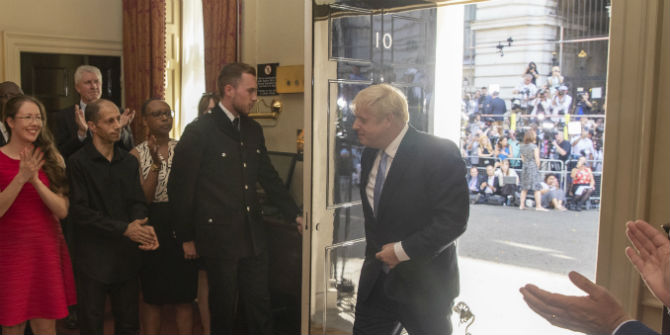 Boris Johnson said the chances of no deal were ‘a million to one’. His government is also actively preparing for it. Phil Syrpis (University of Bristol) argues that the new PM’s true intention is likely to be to hold a general election as soon as possible.
Boris Johnson said the chances of no deal were ‘a million to one’. His government is also actively preparing for it. Phil Syrpis (University of Bristol) argues that the new PM’s true intention is likely to be to hold a general election as soon as possible.
The new Prime Minister, Boris Johnson, has promised that the UK will leave the EU by October 31. His stated aim is to renegotiate the Withdrawal Agreement. Should that be impossible, he promises that we will be ready to leave without a deal on that iconic date. He has assembled a Cabinet, and a team of close advisors who include Dominic Cummings and Matthew Elliott – both, like Johnson and Michael Gove, leading figures in Vote Leave – who support these aims, and who are determined and optimistic that they will be able to achieve them. We will, do or die, they say, realise Brexit.

It is of course possible that Boris Johnson is true to his word, and succeeds in delivering Brexit on or before October 31. This piece – which builds on a Twitter thread I wrote on July 25 – suggests that the reality may be different. It assumes that Boris Johnson’s principal motivation is not Brexit, but power. It suggests his aim is not to achieve Brexit by October 31, but rather to establish a narrative to enable him to win a pre-Brexit general election. Were he to win an overall majority he would be able, in the new political context, to reconsider his Brexit options. In this reading, the determined pursuit of Brexit – and in particular of a no-deal Brexit – is not the end, but merely a means to the end.
The problems with the stated aim
To begin with, there is very little chance that the renegotiation with the EU will be successful. The European Council decision of 11 April 2019 extending the Article 50 period, in its paragraph 12, expressly excludes any reopening of the Withdrawal Agreement. There is no sign of a ‘solution’ to the Irish border conundrum. And there has never, to my mind, been a convincing explanation as to why a ‘credible threat’ of no deal, forecast to cause significantly more damage to the UK than to the EU, will result in new ‘concessions’ from the EU, whose overriding interest is – and will remain – the protection of the integrity of the single market. It looks as though the renegotiation may be over very soon. It is not difficult to hear the beginnings of a case being made against the intransigent, inflexible, undemocratic, European Union.
And next, the path towards ‘no deal’ by October 31 is by no means smooth. This is for three linked sets of reasons. First, it is likely that there will be strong opposition within the Conservative Party, and within Parliament, to any move towards a no-deal Brexit. Given that his majority looks likely to be cut to 2 after this week’s by-election, Johnson can ill afford any internal opposition. And although the opposition to Johnson is divided, it is united in the desire to avoid no deal (though MPs have missed more than one opportunity to ‘take no deal off the table’). It is far from certain that PM Johnson would survive a vote of no confidence if his renegotiation fails, and he begins to actively pursue no deal.
Second, the delivery of any no-deal Brexit is difficult. We are, both legally and economically, as reports this week from the CBI and the Institute for Government illustrate, categorically not ‘no deal’ Brexit-ready. As the government’s preparedness notices amply illustrate, much of what is needed to ‘manage’ no deal relies on the passage of legislation – and hence Parliamentary support on which Johnson would be unwise to rely – and on coordination with the EU, whose likely first ask will be… a guarantee relating to the divorce bill, citizens’ rights, and the Irish border.
And third, any no-deal Brexit necessarily involves making the abstract Brexit, which won 52% support in the referendum of 2016, into something concrete. Almost inevitably, this reification of Brexit will alienate some of its erstwhile supporters. It has become almost axiomatic that proponents of Brexit fail not just to deliver it, but also to define it: Vote Leave was a deliberately broad church, Theresa May treated us to months of ‘Brexit means Brexit’, and even now, urgent questions about what a no-deal Brexit might entail remain stubbornly unanswered.
The case for a pre-Brexit general election
This all goes to show that leaving the EU by October 31 is likely to be very difficult, both from a political and a practical perspective. It may be that Johnson’s strategy is not to deliver no deal, but instead – having been thwarted first by an intransigent EU, and then by a remainer Parliament (Jacob Rees-Mogg is just the man to ensure that Parliamentary proceedings are presented in a suitably arcane and labyrinthine way) – to be forced to call a general election, in which he can position himself as the champion of the UK and the champion of the people.
If this is indeed his strategy, it is not without risk. But he is in a difficult position, and none of his options are risk-free. Given the timetable, it is likely that he would require an extension to Article 50; something which Johnson has said that he will not countenance. But if MPs conspire to make it impossible for him to deliver no deal – for example if a handful of Tory MPs refuse to support him, or if a majority of MPs supports a vote of no confidence against his leadership – he may credibly be able to say that his hand has been forced. Were an extension request to be made in October, it is of course possible that the EU will reject it, but it is more likely that they would be prepared to grant an extension in order to enable a ‘democratic event’, such as a general election, which provides a (perhaps slim) prospect of unlocking the impasse in the UK, to occur.
The greatest risk for Johnson is of course that he may not win a majority in a pre-Brexit general election. He is vulnerable on the one side from Nigel Farage’s Brexit Party, and on the other, from Labour, the Liberal Democrats, the Greens and the Nationalist parties. Nonetheless, he has reasons to feel optimistic. His pitch – that he is fighting the election in order to stand up to the twin evils of the EU and the remain establishment and achieve a mandate to (finally) deliver Brexit – will mirror that of the Brexit Party. If the Brexit Party continues to poll strongly, he may be able to consider some form of electoral pact with Nigel Farage. If he is feeling confident, he may instead choose to take him on. He also has grounds to suspect that the remain-leaning opposition parties will be divided. Relations between Labour, the Liberal Democrats and the Scottish Nationalists are strained. There is, in addition, no coherent message emerging from the various disparate factions. Some want to deliver a better Brexit; some hope for a people’s vote; only a few are prepared to make the call to revoke Article 50. He has assembled a team which seems well equipped to exploit his opponents’ weaknesses, and to fight – and win – an election. Given the divisions in the opposition, a 30-35% vote share is likely to afford him a majority in the House of Commons.
If he wins, he acquires the ability to reconsider his Brexit options. The problems associated with Brexit will remain the same, but the political context will be much changed. He will, at that stage, be in a position to reveal, or perhaps to begin to formulate, his true intentions. He is brazen enough to resile from inconvenient promises. He may opt for no deal or he may, for example, opt for leaving on the basis of the current withdrawal agreement, with a Northern Ireland-only backstop, aiming to secure a free trade agreement between GB and the EU. He will be guided by the possibilities which the new Parliament creates for him. His desire will be to move beyond Brexit, and – for better or worse – to deliver his vision for the UK.
This account may of course be wrong. Johnson may genuinely do all he can to deliver Brexit by October 31. He may succeed. If he fails, this may become his ‘Plan B’. And it may play rather better for him than a successful ‘Plan A’.
This post represents the views of the author and not those of the Brexit blog, nor LSE.







I don’t quite understand the timing. Assuming there is a GE before Brexit, will the GE be before October 31st or afterwards?
If before, there’s not a lot of time to organise it. The article talks about Boris Johnson’s plans being “thwarted first by an intransigent EU, and then by a remainer Parliament”. All that thwarting is going to take time. Parliament is supposed to come back on the 3rd of September. In addition the Brexiteers will argue that the EU hasn’t really been given a chance to show its intransigence until a lot closer to the deadline. Calling an election early also requires the cooperation of the Opposition and they may well not want to support an election date where an incoming administration is faced with a week to go before the Brexit time bomb explodes. The best way of doing this would be if Parliament were to pass an act forcing Boris Johnson to seek an extension, but it seems that there are procedural reasons why that would be difficult.
Or will the GE be after October 31st? Then Boris Johnson will have to ask for an extension and will go into an election having broken a key promise. That would not be easy for him.
Certainly I expect the Conservative Party is getting into election mode, but that doesn’t mean they want it. If for example the Conservative Party can show they are ready to fight an election, that will make the Opposition less likely to attempt to force one.
Thanks for this. All very good points. I think that you are right to say that (for all sorts of reasons) we will only move past the renegotiation, and the thwarting of no deal, in October. That means, as you say, that Johnson will likely have to ask for the necessary extension. It will be difficult.
The question is whether the alternative is any easier. The alternative is forging ahead with no deal. How will he get Parliament to agree to pass the legislation which might help to manage it? How will he reach an FTA type arrangement with the EU (esp without compromising on the backstop etc)? Will the real no deal Brexit still command support? What do the next few months look like for Johnson (with his almost non-existent majority)?
I guess the reality is that he (and we) are now in a place in which there are no easy solutions.
“I guess the reality is that he (and we) are now in a place in which there are no easy solutions.” You said it!
Let’s assume for the sake of argument that the EU hasn’t budged at all by mid-October. (I think they might, for example by allowing a distant time-limit to the backstop followed by a possible hard border, if the Irish government decides they prefer this to no-deal.)
Boris Johnson knows he will have to face a GE sooner or later, and as you say he wants power. Your suggestion is that he will want one sooner, first asking for an extension from the EU. I think if he does this he will be absolutely skewered by the Brexit Party and might very well end up losing.
Or he can face a GE later, after Brexit. He might just survive until 2022, or he might be forced out earlier. But in either case, he will probably pick up most of the Brexit Party votes. There will probably be some chaos after Brexit, but if he can blame that on rebellious Tories and Opposition MPs refusing to pass necessary legislation so much the better. In any case, I would expect a lot of Remain Tories to get behind Johnson the UK is out of the EU, because they also like power. With a bit of fight-them-on-the-beaches and blood-sweat-and-tears rhetoric, together with a lacklustre performance by Jeremy Corbyn, I can easily imagine Boris Johnson being reelected.
PS: Thank you for engaging in the discussion. I do so appreciate it when article authors do this.
A number of very interesting questions. My takes on them:
1. “How will he get Parliament to agree to pass the legislation which might help to manage it?”
Once No Deal actually occurs and there is no going back he can probably get Parliament to pass any number of bills needed to manage No Deal. He can use this to his advantage too in a new GE campaign after No Deal by pointing out that he wanted to mitigate any disruptions but Labour/Lib Dem/Remainer Tories refused and tied his hands
2. “How will he reach an FTA type arrangement with the EU (esp without compromising on the backstop etc)?”
After No Deal he probably won’t be interested in an FTA with the EU as a priority (he will still want it but it will be lower down on the list) and possibly is thinking that after a new GE he can probably work up a majority that goes for a Great Britain only FTA with a backstop arrangement for Northern Ireland as he won’t need the DUP.
3. “Will the real no deal Brexit still command support?”
I think this is the wrong question. The real no deal Brexit does not need to command support anymore than an earthquake or a storm does. What needs to command support is his responses to it. If he frames it as an unavoidable event due to EU intransigence then it becomes an external action rather than a choice by the government.
4. “What do the next few months look like for Johnson (with his almost non-existent majority)?”
Quite likely an interesting ride.
To be perfectly honest, I can’t join in this criticism of Johnston.
He is going to destroy the ‘union’ of the UK, ensure Scottish independence and Irish re-unification, possibly destroy the tory party, ensure that Brexit is so bad (he seems to insist on no deal – election or not, so destroying the Irish Good Friday Agreement, so inviting a US trade deal veto by Congress, so impoverishing the rUK in big way) that the rump UK will rejoin the EU in a matter of years but without the opt-outs and so be encouraged to be a better partner in the EU. I mean, these are all (apart from the impoverishment, but according to the Brexiters the English voted for it) GOOD things to aim for. What’s not to like, really?